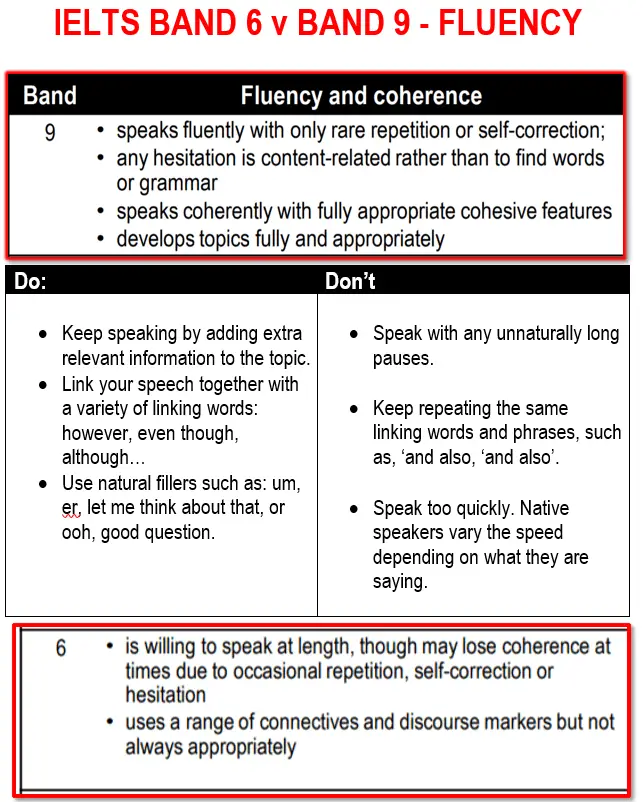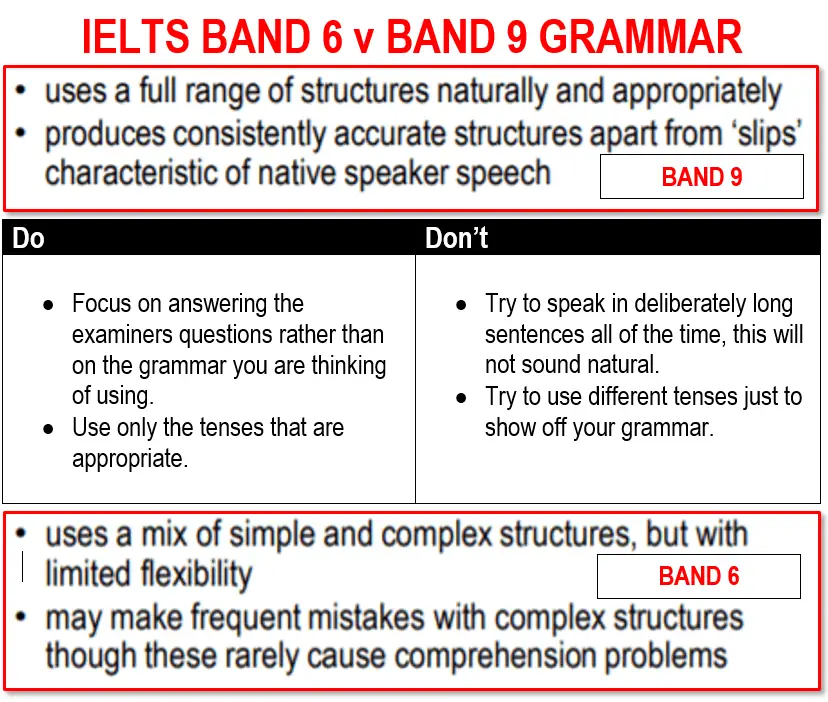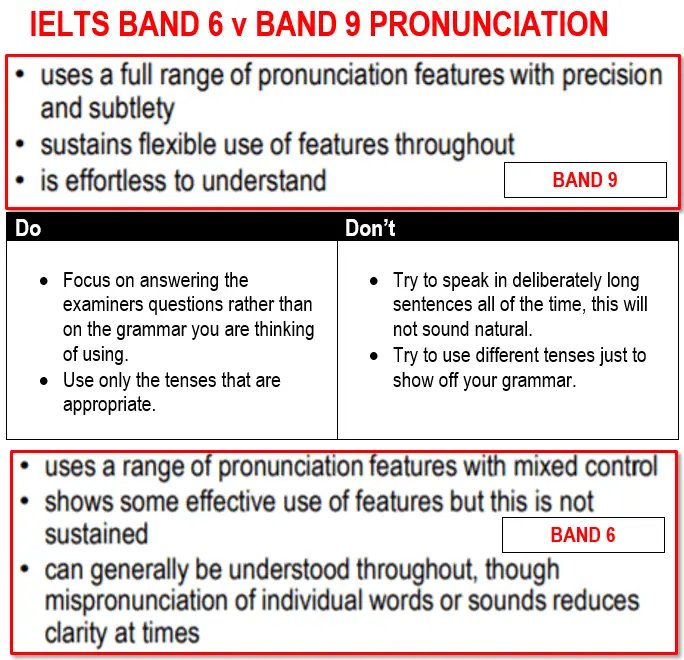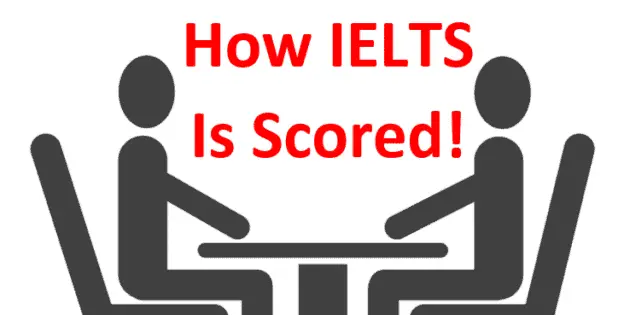Question: How do IELTS examiners mark speaking?
IELTS Examiners mark speaking by assessing your speaking skill across 4 categories, they are: fluency and coherence, lexical resource (vocabulary), grammatical range and accuracy, and pronunciation. The examiner gives you a band score out of 9 for each of those criteria and then the average of those is your overall IELTS speaking band score.
The owners of the IELTS test publish a set of guidelines to show what level a candidate will get on each of the band scores depending on how they perform and we will refer to these official speaking marking band criteria throughout this article.
Let’s take a look at each of the marking band criteria in turn and see what the examiner is looking for in each one. As I am a former IELTS examiner, I will also give you a few tips to help boost your score as well. Sound good? Then read on my friend!
Need To Improve Fast? Get My Complete Course Today!

How Is IELTS Speaking Fluency And Coherence Marked?
First up is ‘fluency and coherence’. Basically, this category is assessing whether you can speak on your own for an extended period of time in a natural way like a native speaker could. In part 2 of the IELTS speaking test this is really important.

Accordingly, a band 9 candidate will speak fluently, rarely repeat or correct themselves. Hardly ever hesitate, use a range of linking words and expand on topics.
A band 6 candidate can speak for a long time on their own but they may not make sense all of the time. They may occasionally repeat/correct themselves and they will use different linking words (cohesive devices) but they may use them incorrectly at times.
Band 7 and 8 candidates will be somewhere in between and the examiner uses their experience and training to make a judgment as to what band they are at, so the opinion and judgment of the examiner are important here.
Fluency Tips
The examiner will notice straightaway how comfortable and confident you are at speaking. It is okay to pause naturally, or even to take a moment to think if you are asked a tricky question.
You will probably use one of these common fillers: um, er, hmm, or a short phrase to buy yourself time to think, try: ‘Hmm, let me think’, ‘Oh, good question, to be honest I’m not sure’, or Well, actually, off the top of my head I’m not sure, but…’. After any of those phrases you could then go on to explain your thoughts more.
If you do pause and the examiner believes you have paused because you are thinking about the language to use and not the idea, then this is going to reduce your band score, especially if it happens time and again.
Never forget that the examiner is assessing you on your test performance overall though, so if you ‘mess up’ one part or hesitate a lot in one place then do not worry! Just keep going it may not be as bad as you think.
How Is IELTS Speaking Lexical Resource Marked?
Lexical resource is just another name for vocabulary and the examiner wants to see how wide your range of vocabulary is AND if you can use those words correctly.
This includes getting the correct form of the word adjective adverb, noun, past tense form correct and if you use your vocabulary in combination with other words in the same way that native speakers do, which is known as collocation.
A neat way to see which words native speakers commonly fit with the new words you are using is to use this tool here, a Corpus of English.
Simply type in the word you are learning and you will be given as many example sentences using that word as you need. You can then clearly see how the word is used.
Let’s look at the band 9 and band 6 criteria and the do’s and don’ts now:
As you can see a band 9 candidate will have enough vocabulary to talk about any topic they are faced with. They will also use idioms almost without thinking or knowing that they are doing it, as it is such a natural thing for them to do.
A band 6 candidate on the other hand will make themselves understood but because their range of vocabulary is less they will not be able to convey detailed thoughts as easily. When they can’t think of the right word to say though, generally they will be able to think of different words to say instead which is known as paraphrasing.
IELTS Vocabulary Tips
It’s really important to focus on using the words that you already know correctly. Don’t try to over-complicate things by trying to impress the examiner by using words that you have only just learned.
Remember, if you use words ‘inappropriately’ as you might with words you have just learned then you will be heading for a band 6, whereas, if you just use the words you are sure about you may score higher.
In part 1 and 2 of the speaking test try to speak about real life experiences you have had, or tell a real story that happened to you. When you talk about real experiences you remember much more detail and when you explain/describe that detail then you will naturally show off your vocabulary.
However, if you are simply ‘making stuff up’ it is hard to do this and you may end up just talking generally about something and not displaying higher level vocabulary.
How Is IELTS Speaking Grammatical Range and Accuracy Is Marked?
For this band, the examiner wants to see what range of grammatical structures you can use correctly and assess the complexity of your sentences.

As per the band descriptors above, a band 9 candidate will make barely any mistakes in their writing and the will use an appropriate grammatical structure to answer the question that is asked of them.
A band 6 student is someone who is making some sort of mistake in most sentences but they can still be understood.
Top Grammar Tips
Forget about your grammar, and I mean that!
It is impossible to think about the grammar you are using and speak fluently at the same time. If you do try to monitor your grammar ‘as you go’, you will end up hesitating, correcting yourself and speaking very unnaturally, which will hurt your fluency and coherence score in particular.
Instead, just use the grammar you do have confidently, this will mean you keep speaking which can in turn help aid your confidence during the exam.
Clearly then, the less mistakes you make the better and the best way to do this is to only use grammar that you are sure about. If you start trying to use grammatical structures that you don’t usually use, such as the third conditional and you get it wrong, then that is going to harm your band score.
So, the smart thing to do is to just use language you are confident and used to using. Check out our guide for IELTS Speaking part 3 here.
How Is IELTS Speaking Pronunciation Marked?
As regards pronunciation, the examiner will be listening to four main features: sound linking, intonation, individual phonic sounds and general clarity.

As per the band descriptors above, for a band 9 obviously the candidate links appropriate words together so two or more words will blend into one continuous flow/chunk. They will put stress onto the correct part of the word and tricky sound such as the ‘th’ and ‘f’ sound will be pronounced correctly.
IELTS Pronunciation Tips
Be aware of sound linking, this is a key pronunciation skill and it works like this. When one word ends in a consonant sound and the next word starts with a vowel sound, the two words should blend together. By this I mean that the end sound of the first word becomes the starting sound of the next word.
This means that when you say a sentence such as, ‘I live in a flat’, you will actually say ‘I liveina flat.’ The middle three words will merge together.
Examiners will notice whether you do this very quickly in part 1 of the IELTS speaking test and it is something you should practise. Simply listen to and mimic how native speakers blend their words together – you need to do the same? Record yourself and see if you do it.
IELTS Speaking Marked/Sample Interviews…
So, that is how IELTS examiners mark speaking tests and how to go from a band 6 to a band 9 in iELTS speaking. Let’s finish this post with an example of a band 6 and a band 9 candidate just to clarify everything.
Band 6 Speaking Sample:
Band 9 Speaking Sample:
Now you know how IELTS examiners mark speaking tests you can hopefully identify which aspects you are not so good at and work on improving those areas first!
I highly recommend that you record yourself speaking and either see what mistakes you are making yourself or get a native speaker to tell you what mistakes you are making.
You might also want to read our full IELTS speaking guide here.
Recommended IELTS Study Tools
Thank you for reading this article. I always get lots of questions about how else to get a better band score quickly. So, this is what I recommend:
Complete IELTS Course: Of course, my full course ‘INCREASE YOUR IELTS‘ covers everything you need to need to know to pass IELTS, including practice questions, model answers, grammar work, strategies for every possible reading, writing and listening question type, as well as a complete speaking course too, check it out here.
IELTS Essay and Speaking Feedback: To complete full mock tests and get feedback from IELTS examiners on your IELTS essays or speaking tasks then visit: IELTS Feedback and Mock Tests, here.
Improve your grammar fast by using the Grammarly suggestions to improve your writing. Every IELTS students should have this free grammar improving tool.
Improve all-round English skill with EnglishClass101.com. If you have failed IELTS more than once then you probably need to improve your general level of English. Use the free online lessons and vocabulary building tools here and start improving today! HIGHLY RECOMMENDED!





